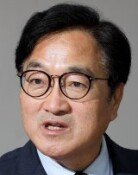Gov`t Last-minute Intervention Shakes Up Forex
Gov`t Last-minute Intervention Shakes Up Forex
Posted July. 04, 2008 07:09,
With 20 minutes before Seouls foreign exchange market closed, tension heightened in dealing rooms of commercial banks on Wednesday. At 2:40 p.m., the won-dollar exchange rate, which had stayed around between 1,045 won and 1,049 won per dollar, suddenly skyrocketed. At 2:44 p.m., the won-dollar exchange rate soared to 1,057 won. If the market had closed at the rate, the won-dollar exchange rate would have set a new high in 32 months since Oct. 24, 2005, when the rate jumped to 1,058.10 won.
At that time, the foreign exchange market faced an unexpected change. With an enormous amount of dollar being put on the market, the won-dollar exchange rate plunged to close at 1,035 won. For only 16 minutes, the rate fell a whopping 22 won. It was the result of the governments intervention. In an effort to prevent consumer prices from soaring as a result of the surging won-dollar exchange rate, the government sold most dollars since the beginning of this year. Since the trading volume surged just few minutes before the closing of the market, the closing rate of the day was announced five minutes after the market closed.
○ Gov`t dropped "dollar bomb"
Amid the stock market crash and surging international oil prices, expectations that the won-dollar exchange rate would increase heightened immediately after the market opened on that day. However, buyers and sellers were pitted against each other. After fluctuating in a narrow band, the foreign exchange rate faced an injection of an enormous amount of dollars just few minutes before the closing of the market.
Noh Sang-chil, head of the trading department at Kookmin Bank, said, When the won-dollar exchange rate reached 1,040 won, many dealers believed that the exchange rate bottomed out and began buying dollars. As the rate fell further, some of them placed stop-loss orders. That contributed the foreign-exchange rate to fall further.
A foreign exchange dealer said, Usually, the government intervenes in the market only slightly. However, it seemed determined to sell dollars until the end.
Even though the government did not disclose whether it intervened in the market or how much dollars it injected in it, foreign exchange dealers estimated that the government sold $3-4 billion via two or three commercial banks.
○ Unclear long-term effect
Since the government has shifted its economic policies from economic growth to price stabilization, the central bank has intervened in the market so as to prevent the foreign exchange rate from surging. An increase in the foreign exchange rate results in an increase in import prices and consumer prices. However, the amount of the central bank`s selling has been usually smaller than $1 billion.
However, since President Lee Myung-bak stressed that the government should put priority on price stabilization at the Cabinet council meeting on June 24, the Bank of Korea has intervened in the foreign exchange market more proactively. Particularly, Wednesday was the symbolic day when the government announced its economic policies for the second half and reiterated that it would make an all-out effort to stabilize the soaring consumer prices.
Nevertheless, some experts argued, The governments market intervention will only result in a decrease in its foreign exchange reserve. It will not contribute to stabilizing the foreign exchange rate. A foreign exchange dealer said, The market waits for the government to put its dollars on the market. If the government begins intervening in the market, foreign exchange dealers would buy dollars at a cheaper price, sending the exchange rate back to the original place through the process. On Wednesday, with the intervention of the government, the won-dollar exchange rate fell to 1,035 won but rose by 10 won to 1,045 won the next day.
However, the governments intervention signaled its strong will to stabilize consumer prices. The message was this: Watch your steps unless you want to go head-to-head with a government that has a foreign exchange reserve of $258.1 billion.







